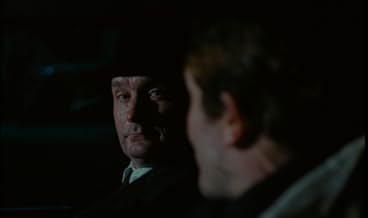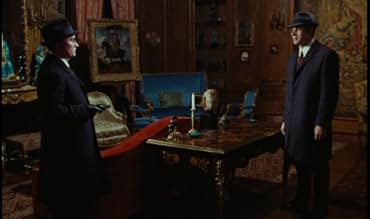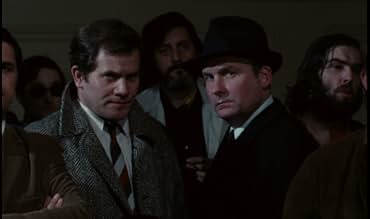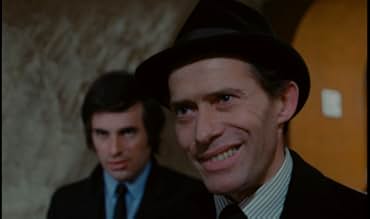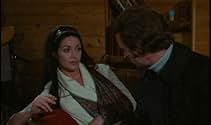VALUTAZIONE IMDb
6,8/10
758
LA TUA VALUTAZIONE
Aggiungi una trama nella tua linguaWhile investigating a drug case, an inspector is shot dead by a gangster. His colleague, Inspector Favenin, is assigned to solve this crime. He is ready to do anything to save his colleague'... Leggi tuttoWhile investigating a drug case, an inspector is shot dead by a gangster. His colleague, Inspector Favenin, is assigned to solve this crime. He is ready to do anything to save his colleague's honor, even if it means going beyond the law.While investigating a drug case, an inspector is shot dead by a gangster. His colleague, Inspector Favenin, is assigned to solve this crime. He is ready to do anything to save his colleague's honor, even if it means going beyond the law.
- Regia
- Sceneggiatura
- Star
Gianni Garko
- Dan Rover
- (as John Garko)
Anne Carrère
- Christine
- (as Anne Carrere)
Théo Sarapo
- Lupo
- (as Theo Sarapo)
Jean-Claude Bercq
- Germain
- (as Jean-Claude Berck)
Stéphan Holmes
- Le jeune garçon
- (as Stephan Holmes)
Recensioni in evidenza
Yves Boisset is not one of the famous French directors, which amplifies for me the (pleasant) surprise of watching his 1970 film 'Un condé' ('The Cop'). The director, who had been Jean-Pierre Melville's assistant, among others, demonstrates here that he not only learned many of the secrets of the trade from his master, but also that he had the courage to combine the genre of film noir (a tradition in French movies) with political cinema. The result makes of 'Un condé' both violent entertainment in the genre of the movies in which the cops are only a little less evil than the gangsters they face, and a political film in which a crisp message and characters immersed in moral corruption. In perfect synchronicity with what was happening at the same time in American cinema, 'Un condé' brings to the screen a vigilante hero with whom, as spectators, we identify for a while, until the moment the violence accumulates and we begin to question whether justice achieved through such illegal means remains justice, even in situations where there seems to be no alternative to the use of violence.
I liked the way this story is told. It starts with a settlement of accounts in the underworld between a gang of mobsters who do not hesitate to use any kind of violence to achieve their goals and the owner of a place who refuses to give up and pays with his life. When his sister and his best friend decide to take revenge, we, as spectators, cannot help but empathize with their feelings. A pair of policemen who seem incorruptible and who, because they are honest, are marginalized in a system that prefers to reach a 'modus vivendi' with criminals, comes into action. When one of them is killed by the same gang of mobsters, revenge seems justified, and again, as spectators, we are involved. The problem is that the world described in the film does not know clean methods to achieve its goals. Revenge means homicide, and police use Gestapo-like methods of interrogation. Made in 1970, 'Un condé' contains a strong post-1968 message of protest against police violence, which Yves Boisset will continue in his future films.
Made during the heyday of the 'film noir' genre in French cinema, a genre that had absorbed some of the talents of the New Wave, 'Un condé' is not inferior to many of the best-known achievements of the genre. The clear and intelligent script, the consistent visual conception and the fact that the characters are not morally judged for what they do contribute to this. They are committing atrocities for noble causes: friendship, fighting crime, opposing police corruption. If there is a culprit, this is the system that does not leave them too many alternatives. Michel Bouquet creates one of the best roles of his career and Michel Constantin adds another role to the ones that made him a favorite actor in gangster movies over several decades. I recommend the film, which in my opinion falls into the category of cinematic jewels that need to be rediscovered.
I liked the way this story is told. It starts with a settlement of accounts in the underworld between a gang of mobsters who do not hesitate to use any kind of violence to achieve their goals and the owner of a place who refuses to give up and pays with his life. When his sister and his best friend decide to take revenge, we, as spectators, cannot help but empathize with their feelings. A pair of policemen who seem incorruptible and who, because they are honest, are marginalized in a system that prefers to reach a 'modus vivendi' with criminals, comes into action. When one of them is killed by the same gang of mobsters, revenge seems justified, and again, as spectators, we are involved. The problem is that the world described in the film does not know clean methods to achieve its goals. Revenge means homicide, and police use Gestapo-like methods of interrogation. Made in 1970, 'Un condé' contains a strong post-1968 message of protest against police violence, which Yves Boisset will continue in his future films.
Made during the heyday of the 'film noir' genre in French cinema, a genre that had absorbed some of the talents of the New Wave, 'Un condé' is not inferior to many of the best-known achievements of the genre. The clear and intelligent script, the consistent visual conception and the fact that the characters are not morally judged for what they do contribute to this. They are committing atrocities for noble causes: friendship, fighting crime, opposing police corruption. If there is a culprit, this is the system that does not leave them too many alternatives. Michel Bouquet creates one of the best roles of his career and Michel Constantin adds another role to the ones that made him a favorite actor in gangster movies over several decades. I recommend the film, which in my opinion falls into the category of cinematic jewels that need to be rediscovered.
Yves Boisset directs "Un Condé" with remarkable succintness and efficiency. To that end he is greatly assisted by Michel Bouquet's deadpan, top drawer performance, who in turn is well supported by Bernard Fresson, Adolfo Celi, Gianni Garko and the beautiful Françoise Fabian.
Inspector Favenin's character is built layer by layer and Bouquet emerges very convincingly as a copper doubling up as vigilante. The script is very good, with sharp dialogue, including copper talk in French. It would appear that this film provided some inspiration for DIRTY HARRY the following year and DEATH WISH in 1974.
Very competent and economical cinematography, reminiscent of Don Siegel's straightforward punches pulled approach to action.
I strongly recommend this film to anyone interested in film noir and in the French cinema.
Inspector Favenin's character is built layer by layer and Bouquet emerges very convincingly as a copper doubling up as vigilante. The script is very good, with sharp dialogue, including copper talk in French. It would appear that this film provided some inspiration for DIRTY HARRY the following year and DEATH WISH in 1974.
Very competent and economical cinematography, reminiscent of Don Siegel's straightforward punches pulled approach to action.
I strongly recommend this film to anyone interested in film noir and in the French cinema.
Tough-as-Cop thriller from a clearly not-so-belle France, moodily shot with a real flair for coolly capturing callous street justice by, Yves Boisset, whose terse, muscular mise-en-scène translates excitingly into a remarkably grim, morbidly fascinating French crime thriller. The legendary French actor, Michel Bouquet is genuinely chilling as the flinty L'inspecteur Favenin whose amoral and increasingly brutal journey to avenge the fruitless death of a fellow officer leads him ever deeper into a violent existential nightmare!
'Un condé' (1970) is a magnificently bleak, profoundly philosophical Gallic Euro-crime which works brilliantly as a savage expose of police barbarity, dealing unflinchingly with the ultimate societal conundrum; must one become like the beasts in order to deal with the beast? The only thing that marred my enjoyment of this wickedly immersive Gallic crime treat is that the source VHS print of my bootleg was a trifle muddy. An immaculately restored, UK-friendly, bells & whistles DVD/Blu-ray edition of this exquisitely cold example of gripping, abyssal dark 70s French policier is LONG overdue!
'Un condé' (1970) is a magnificently bleak, profoundly philosophical Gallic Euro-crime which works brilliantly as a savage expose of police barbarity, dealing unflinchingly with the ultimate societal conundrum; must one become like the beasts in order to deal with the beast? The only thing that marred my enjoyment of this wickedly immersive Gallic crime treat is that the source VHS print of my bootleg was a trifle muddy. An immaculately restored, UK-friendly, bells & whistles DVD/Blu-ray edition of this exquisitely cold example of gripping, abyssal dark 70s French policier is LONG overdue!
This was a rather more than faithful adaptation of the Pierre Lesou's novel. A fierce story about two vengeance schemes involved one in the other. Two friends decide to avenge the death of one of their own and then kill a cop whose his friend decides to avenge him...Follow me? You have here one of best Michel Constantin's performances ever. Don't miss him facing Michel Bouquet. His lines are unforgettable. But something is missing, if you compare to the book. HOW DAN ROVEL'S CHARACTER GETS OUT OF JAIL?
No one seems to have noticed this detail.
Typical from Yves Boisset about the power of police, and the way cops sometimes can trespass the law. A true powerful film.
No one seems to have noticed this detail.
Typical from Yves Boisset about the power of police, and the way cops sometimes can trespass the law. A true powerful film.
Increasingly I have more respect over the real French movies, this Noir picture has a fabulous phrase said by Adolfo Celi, "Beware don't try to save the world, just defend the society as it really is" that reflects on our kind of society, when his partner and close friend L'Inspecteur Barnero (Fresson) was killed pursuing two killers, the honest L'Inspecteur Favenin (Bouquet) decides make justice by own hands, killing all them whom were involved with Barnero's death, unusual plot, Faverin an inconspicuous policeman, using all kinds of gimmicks to get his revenge, a slight cold behavior, sneaky he get in at house's assassin Villete (Constantin) there he faces the killer, a fabulous sequence, killing him like a dog, nevertheless came out the regret, even an unknown picture if look the numbers of votes at IMDB, just few 270 with seven reviews only, it has a great casting, although it's a brutal movie, violent and contemporary, a realistic picture, impressed me entirely, hope others have a change to see the hidden
gem from the director Yves Boisset who displayed several allusive red posters !!
Resume:
First watch: 2019 / How many: 1 / Source: DVD / Rating: 8.5
Resume:
First watch: 2019 / How many: 1 / Source: DVD / Rating: 8.5
Lo sapevi?
- QuizAlthough his film is close to Pierre Lesou's novel, director Yves Boisset confessed that, during the scene between Michel Constantin and Michel Bouquet, he was influenced by Jean-Pierre Melville's films' atmosphere and dialogue.
- Versioni alternativeDue to pressure from then French Minister of the Interior Raymond Marcellin, the film had a tough time getting approved for release and director Yves Boisset was finally forced to cut a few lines of dialogue and reshoot the interrogation scene. The film was shown uncut and with the original scene internationally. In France, the original scene can be seen as a bonus feature on home video.
- ConnessioniReferenced in Parole de cinéaste: Yves Boisset: le cinéaste le plus censuré de France (2013)
I più visti
Accedi per valutare e creare un elenco di titoli salvati per ottenere consigli personalizzati
Dettagli
- Data di uscita
- Paesi di origine
- Lingue
- Celebre anche come
- The Cop
- Luoghi delle riprese
- Fourges, Vexin-sur-Epte, Eure, Francia(ending scene at the water mill)
- Aziende produttrici
- Vedi altri crediti dell’azienda su IMDbPro
- Tempo di esecuzione1 ora 35 minuti
- Mix di suoni
- Proporzioni
- 1.66 : 1
Contribuisci a questa pagina
Suggerisci una modifica o aggiungi i contenuti mancanti

Divario superiore
By what name was L'uomo venuto da Chicago (1970) officially released in India in English?
Rispondi
